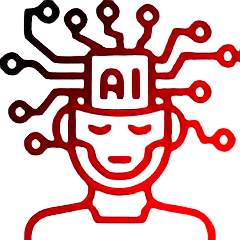AI in healthcare has enormous potential to transform patient care, diagnosis, and treatment, but responsible and successful deployment still requires ethical issues, openness, and human knowledge.
When artificial intelligence techniques and technologies are applied to help healthcare practitioners diagnose and treat patients, it's referred to as using AI tools in the medical field.
These technologies evaluate medical data, spot trends, and offer forecasts or suggestions using machine learning algorithms and data analytics. Healthcare practitioners may make better decisions, improve patient outcomes, and expedite clinical operations by utilizing AI. Artificial intelligence (AI) tools are redefining medicine and changing the way healthcare is delivered, from virtual assistants to automated image analysis.
It is impossible to overestimate the value of AI technologies for medical professionals. These resources offer insightful information that helps medical professionals identify and treat patients accurately. Doctors can examine vast volumes of patient data quickly and effectively with AI algorithms, which will save them time and increase productivity. AI technologies also assist medical professionals in keeping abreast of current findings and developments in the field, enabling them to give their patients the best care possible.
AI-Based Diagnostic and Therapeutic Tools
In the world of medicine, machine learning algorithms for precise diagnosis and individualized treatment regimens are becoming more common. Large volumes of patient data, such as lab results, radiology scans, and medical records, can be analyzed by these algorithms to find patterns and connections that human doctors would miss. Artificial intelligence (AI) algorithms can precisely diagnose illnesses and ailments and even forecast patient outcomes by learning from this data. This can help physicians make better decisions and offer patients more individualized treatment alternatives.
Artificial intelligence (AI)-driven decision support systems can also aid in lowering medical errors by giving healthcare professionals real-time advice and reminders. Furthermore, these systems have the ability to remotely monitor patients round-the-clock, informing medical staff of any changes in their status that would need to be attended to right away. In the end, integrating AI into healthcare has enormous potential to improve patient outcomes and care while lowering costs.
AI in healthcare is also being used to streamline treatment processes using virtual assistants. Healthcare providers can get help from these virtual assistants with arranging tests and treatments, keeping track of patient visits, and even writing prescriptions. Virtual assistants save healthcare practitioners considerable time by automating these administrative procedures, allowing them to concentrate on providing direct patient care.
Additionally, by offering patients individualized information and direction, these assistants can support patients in navigating their treatment programs and making knowledgeable healthcare decisions. In general, virtual assistants in healthcare settings have the potential to increase productivity and enhance patient satisfaction.

The best ai tools for doctors
AI-Powered Instruments for Tracking and Managing Patients
AI-enabled wearables have the potential to completely transform patient care and monitoring. These gadgets can check vital signs like blood pressure and heart rate continually and instantly notify medical specialists of any irregularities found. Better patient outcomes are ultimately possible because of this, which makes early intervention and proactive healthcare management possible. Furthermore, by analyzing the gathered data and offering individualized recommendations for medicine or lifestyle modifications, these devices' AI capabilities enable patients to take charge of their own health.
The way chronic illnesses are addressed is likewise being revolutionized by remote patient monitoring technologies. Patients can simply send their vital signs and other health information to their healthcare providers from the comfort of their own homes with these systems. This lessens the workload for medical institutions as well as patients by doing away with the requirement for regular in-person visits. Furthermore, by using these systems, medical practitioners may keep a close eye on patients who have long-term illnesses and take quick action in the event that any alarming patterns or symptoms appear. Remote patient monitoring systems accomplish this to raise the standard of care provided to people with chronic illnesses and to improve their general health.
Another exciting use of AI in healthcare is chatbots for patient education and communication. These chatbots communicate with patients by using artificial intelligence algorithms to answer their queries, give them information, and even make tailored recommendations. AI chatbots can improve patient education and empowerment by answering a variety of questions, giving people greater control over their own health.
Furthermore, these chatbots can be available around the clock, giving patients the assurance that they can get help and direction whenever they need it without having to wait for a medical practitioner to become available. In general, AI chatbots have the power to completely transform patient care by enhancing patient outcomes, accessibility, and efficiency. They can ease the strain on healthcare systems by giving patients prompt assistance, especially when it's not an emergency.
AI chatbots can also gather and examine data from patient interactions, allowing medical professionals to spot patterns and trends that improve treatment plans and decision-making. AI chatbots can improve patient happiness in healthcare settings by providing individuals with timely and individualized support, leading to a more positive healthcare experience.
AI Resources for Data Analysis and Research
The use of natural language processing in healthcare research has grown in importance as a means of evaluating medical literature and collecting pertinent data. Large volumes of medical literature may be effectively combed through by AI algorithms, which can then highlight important findings and offer insightful information to researchers. This enables the discovery of new linkages and patterns that may have gone unnoticed, while also saving time and money.
Additionally, by revealing hidden patterns and links that can guide future studies and advances in medical knowledge, AI-powered data analysis tools can assist researchers in making sense of large datasets. All things considered, the healthcare sector could undergo a revolution with the use of AI technologies in research and data analysis, which would result in more precise diagnosis, individualized treatment regimens, and better patient outcomes. Because AI can handle large amounts of data quickly and correctly, medical professionals can use evidence-based insights to make well-informed decisions. This has the potential to significantly improve healthcare delivery's efficacy and efficiency, which would eventually improve patient outcomes and lower the rate of medical errors.
AI can potentially automate monotonous jobs, giving medical professionals more time to concentrate on more complicated and essential patients. AI in healthcare has limitless potential benefits as the technology develops and gets better, providing a bright future for the sector as a whole.
Large-scale dataset pattern-finding AI algorithms have already demonstrated considerable promise in disease diagnosis, patient outcome prediction, and customized treatment plan identification. Artificial intelligence (AI) has the capacity to analyze enormous volumes of data in a fraction of the time it would take a human, allowing it to find hidden patterns and correlations that healthcare professionals would not immediately notice. This may result in earlier disease identification, a more precise diagnosis, and more focused and efficient treatment options for patients.
AI can further improve efficiency and cut costs in healthcare businesses by streamlining administrative operations like billing, managing electronic health data, and scheduling appointments.
AI technology can also be advantageous for clinical research and predictive analytics tools. Artificial intelligence (AI) has the ability to forecast patient outcomes, discover possible research study participants, and even provide individualized treatment regimens by evaluating enormous volumes of data from clinical trials and patient records. Researchers can save time and money by doing this, which may help hasten the creation of novel medications and treatments.
AI can also help track and monitor the efficacy of interventions, enabling researchers to make data-driven choices and continuously raise the standard of care. All things considered, the application of AI to clinical research has the power to transform the discipline and enhance patient outcomes everywhere.
Beyond human comprehension, artificial intelligence (AI) is able to evaluate enormous volumes of data from clinical trials and patient records, finding patterns and making extremely accurate predictions about the future. This may result in more individualized and focused therapies, lowering the possibility of negative side effects and raising the likelihood of positive results. AI can also automate monotonous processes, giving academics more time to concentrate on intricate and innovative areas of their work. The future of clinical research is bright, with the potential to revolutionize the way diseases are identified, treated, and prevented thanks to the ongoing breakthroughs in AI technology.
Ethical Issues and Difficulties
When using AI in clinical research, protecting patient privacy and data security are essential ethical considerations. Sensitive data protection becomes critical as AI uses enormous volumes of patient data for analysis and training. Researchers and legislators must take on the challenge of balancing data accessibility and privacy. To guarantee that every patient receives fair and equal treatment, it is also necessary to closely monitor and mitigate the potential for bias and prejudice in AI algorithms.
In order to create strong norms and frameworks for the ethical application of AI in clinical research, stakeholders must continue to collaborate and have continuing talks about these ethical issues and obstacles.
Prioritizing the key component of ensuring transparency and explainability of AI algorithms is imperative. It gets harder and harder to comprehend how AI algorithms make judgments as they grow more sophisticated and complex. Concerns regarding trust and accountability are raised by this lack of openness, particularly in vital sectors like healthcare.
AI systems' decisions must be trusted, and both patients and medical practitioners must be able to comprehend the logic behind them. As a result, efforts should be made to create guidelines and techniques for communicating AI algorithms in a way that is understandable and accessible to stakeholders who are not technical.
Ensuring justice and equity in healthcare also requires addressing potential biases in AI tools. AI systems may unintentionally reinforce preexisting data biases, resulting in differences in outcomes and treatment for various populations. Proactively identifying and mitigating these biases via stringent testing and validation procedures is crucial. Furthermore, defining precise policies and procedures for AI application in healthcare can aid in preventing misuse or unethical application of these technologies.
This involves making certain that AI systems are applied as instruments to assist in decision-making, not as a substitute for human judgment and experience. AI possesses the potential to significantly transform healthcare for the better by tackling these issues and advancing accountability, transparency, and equity.
Prospects for the Future and a Conclusion
The creation of increasingly sophisticated machine learning algorithms, the integration of AI with other technologies like robots and virtual reality, and the possibility for AI to help with early disease identification and individualized treatment plans are some of the emerging themes in AI for the medical industry. These developments have enormous potential to enhance overall healthcare delivery, lower healthcare costs, and improve patient outcomes.
But as AI continues to advance in the medical domain, it is imperative that privacy concerns and ethical issues stay at the forefront of its application. Furthermore, to guarantee that AI is applied properly and ethically in healthcare, legislators, healthcare professionals, and AI experts must continue their research and collaborate. The application of AI in healthcare must also be governed by appropriate laws and policies. This will assist in preventing any possible abuse or damage that the technology may create.
Furthermore, in order to guarantee AI's safe and successful incorporation into clinical practice, healthcare professionals need to be adequately taught and informed about its applications and limitations. AI has the power to transform healthcare and enhance patient care globally if these issues are addressed and proactive steps are taken.
Personalized medicine, better treatment planning, higher diagnosis accuracy, and more effective healthcare delivery are just a few of the possible effects of AI on healthcare outcomes. Large volumes of medical data can be analyzed by AI algorithms, which can also spot trends that human healthcare providers might not immediately detect.
Better patient outcomes may result from earlier disease detection and more focused treatment regimens. In healthcare settings, AI may also help with workflow management, resource allocation optimization, and patient outcome prediction. All things considered, AI has enormous potential to improve healthcare outcomes. If properly regulated and trained, it may be used to the advantage of both patients and healthcare practitioners.
The value of human knowledge in addition to AI
Healthcare could undergo a revolution thanks to AI, but it's vital to remember that human knowledge still plays a critical role when using AI technology. Because AI algorithms are only as good as the data they are trained on, they occasionally make mistakes or fail to take into account crucial details.
Human healthcare professionals can comprehend AI-generated insights and make defensible decisions because they bring a lot of knowledge, experience, and intuition to the table. Furthermore, AI is unable to replace human connection and empathy, which are crucial for giving patients comprehensive treatment. Therefore, optimizing the advantages of AI in healthcare requires finding a balance between technology and human skills.
Artificial intelligence (AI) is capable of fast and accurate analysis of large amounts of data, but it is unable to comprehend the complex feelings and particular situations that each patient has. Effective therapy requires human healthcare workers to build a trusting relationship with patients and deliver tailored care. Furthermore, in intricate medical circumstances requiring judgment and critical thought, human competence is essential.
Therefore, to fully realize the potential of healthcare innovations, it is imperative to integrate AI technology with human expertise.




